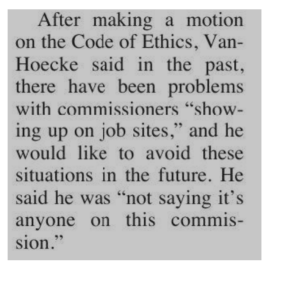Words carry weight:
The scriptures would teach us that the power of life and death is in the tongue. So I would ask you, when you speak is it bringing Life?
No one is challenging anyone’s right guaranteed under the First Amendment to say whatever they want. I am asking if you care about this town, I am asking you to care about our future. I am asking you to think about your words and what benefit they bring when you speak to them. I’m not asking not to post on social media I am asking you to weigh the words, and ask will this bring Life?
I would ask you if it’s important to you to know something come and ask, and the answer shall be given. But if you’re not willing to come in and ask for the information which is freely available then where does the fault lie?
Ask and you shall receive knock, and the door shall be open unto you.
I call upon the people of this community, I call upon all the people of Fort Scott to decide we are going to be a people that come together and put the City Of Fort Scott upon our shoulders that we decide here and now from this moment forward that everything that we do and everything that we say has an impact on all of those around us.
I envision a community that talks to you, not about you. I envision a community that looks for points of agreement and progress, even if it’s only an ounce. For even a small ounce of progress is better than pounds of regress and rage.
I want to be the type of commission that adds value to the community not poisons the value of other contributions. I envision a commission intent on focusing on the idea, not who gets credit for coming up with it.
I want to be the kind of community leaders who goes first with trust and truth.
Where we miss the mark, or drop the ball, let’s acknowledge it.
Let us never be afraid to admit when we are wrong take ownership of that and adjust with authentic intentions.
Let us be more than a community, let us be the team, together, building trust.
I understand that in times of uncertainty, fear seeps in. That fear most often leads to suspicion which can cause an inherent mistrust of all the information that is provided. We want to be the kind of commission that communicates with you clearly and provides the information that shows you the positive aspects and how we are doing everything we can to make sure there is a way forward in positivity.
We are overcoming years of mistrust, most of it justified, and that is not something that will take place quickly, or without the honest intentions and a desire to be a city that inspires you to see the great progress we have made.
This is not to say that there should not be critical discussions about ideas that would help move us forward as a whole. But At the same time attacking a person, as opposed to bringing the conversation to focus on a better idea is unproductive.
I understand that many of you are scared, and this fear leads to an attitude of mistrust and sustained suspicion, but I can promise you that if you come and ask for the information, we want you to know the truth and all of the good things that are going on around you.
This Sunday we spoke for a bit on hope at church, and here’s the rub.
I feel I’ve been called by God to live a life that follows after King Jesus, now within this, that means that I’ve chosen to follow after certain ideals. One of those is speaking life, another is trusting God, but the one we talked about this Sunday is hope.
When faced with that decision of whether I will speak life or death over a situation, I will always choose to speak life, to speak truth, and I ask you to consider whether the words that you are speaking, when you speak them with your mouth or type them on social media, what are those words filled with? What encouragement or idea is being presented?
Is it life or is it death? And if it is an issue that you feel strongly enough about bringing to someone else’s attention, why would you not come to the table and bring your solution and say here is how we resolve that problem. Because if you’re not willing to help solve the problem, then you must consider whether or not you are part of that problem.
So in this, I am going to choose to try to live a life that is a testament to that which the Lord has shown me to live: to speak the truth, to have joy, to allow words filled with life to flow from my mouth, to live with expectation, to foster hope, and to trust that my God will find a way.
We are community, we are Fort Scott, we will not be undone by divisive rhetoric, this is when we come together, this is where we unite, this is where we stand up and be better.
Because together we are better.
Let us be better
There Is another word for hope, it’s a name that was given to Jesus Emmanuel. “ God with us.”
For if the gift of God is with us then how could we not be filled with hope?
God bless you all. God bless Fort Scott.
Jerimiah 33:9 Then this city will bring me joy, glory, and honor before all the nations of the earth! The people of the world will see all the good I do for my people, and they will tremble with awe at the peace and prosperity I provide for Them.
#togetherwearebetter
Mayor City of Fort Scott
Matthew Wells
[email protected]
Cell 417-684-1714
Office/fax 620-223-3090





